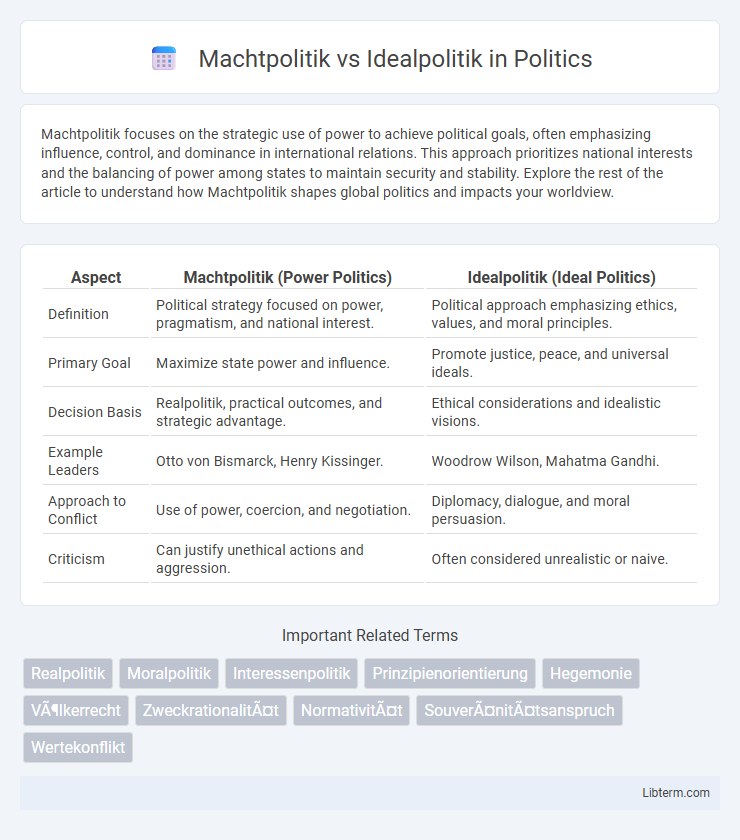Machtpolitik focuses on the strategic use of power to achieve political goals, often emphasizing influence, control, and dominance in international relations. This approach prioritizes national interests and the balancing of power among states to maintain security and stability. Explore the rest of the article to understand how Machtpolitik shapes global politics and impacts your worldview.
Table of Comparison
| Aspect | Machtpolitik (Power Politics) | Idealpolitik (Ideal Politics) |
|---|---|---|
| Definition | Political strategy focused on power, pragmatism, and national interest. | Political approach emphasizing ethics, values, and moral principles. |
| Primary Goal | Maximize state power and influence. | Promote justice, peace, and universal ideals. |
| Decision Basis | Realpolitik, practical outcomes, and strategic advantage. | Ethical considerations and idealistic visions. |
| Example Leaders | Otto von Bismarck, Henry Kissinger. | Woodrow Wilson, Mahatma Gandhi. |
| Approach to Conflict | Use of power, coercion, and negotiation. | Diplomacy, dialogue, and moral persuasion. |
| Criticism | Can justify unethical actions and aggression. | Often considered unrealistic or naive. |
Einführung in Machtpolitik und Idealpolitik
Machtpolitik emphasizes the pursuit of state interests through power and pragmatic decision-making, prioritizing national security and geopolitical influence. Idealpolitik centers on moral values, international law, and ethical principles to guide foreign policy aimed at promoting global justice and cooperation. The introduction to both concepts highlights their contrasting approaches to diplomacy, where Machtpolitik relies on realpolitik strategies and Idealpolitik advocates for normative frameworks in international relations.
Historische Ursprünge der Machtpolitik
Machtpolitik finds its historische Ursprunge in der realpolitischen Theorie des 19. Jahrhunderts, gepragt durch den preussisch-deutschen Staatsmann Otto von Bismarck, der Macht als zentrales Instrument zur Erreichung nationaler Interessen betrachtete. Diese Politik orientiert sich an den Prinzipien des Machtgleichgewichts und der militarischen Starke und lehnt idealistische oder moralische Prinzipien zugunsten pragmatischer Zielsetzungen ab. Im Gegensatz dazu basiert Idealpolitik auf ethischen Werten und internationaler Zusammenarbeit, wobei Machtpolitik die realistische Anwendung von Macht und Einfluss zur Absicherung des Staates betont.
Entwicklung und Prinzipien der Idealpolitik
Idealpolitik entwickelt sich durch die Betonung von ethischen Prinzipien und moralischen Werten in der Aussenpolitik, wobei der Fokus auf friedlicher Kooperation und Menschenrechten liegt. Sie setzt auf diplomatische Losungen, internationale Zusammenarbeit und die Forderung von Gerechtigkeit, basierend auf universalistischen Normen und Rechtsstaatlichkeit. Die Prinzipien der Idealpolitik zeigen sich in der Priorisierung von nachhaltiger Entwicklung, Demokratie und globaler Sicherheit, die als Gegengewicht zur rein machtbasierten Machtpolitik fungieren.
Zentrale Unterschiede zwischen Macht- und Idealpolitik
Machtpolitik konzentriert sich primar auf die Durchsetzung nationaler Interessen durch Machtmittel wie Militar und wirtschaftlichen Druck, wahrend Idealpolitik Werte und ethische Prinzipien in den Vordergrund stellt. Zentrale Unterschiede liegen in der Zielsetzung: Machtpolitik verfolgt pragmatische, oft kurzfristige Machtmaximierung, Idealpolitik hingegen langfristige Ziele basierend auf moralischer Integritat und internationaler Gerechtigkeit. Dadurch unterscheiden sich auch die Mittel, wobei Machtpolitik auf Realpolitik und Interessenaggregation setzt, Idealpolitik dagegen auf Diplomatie, Menschenrechte und normative Verpflichtungen.
Bedeutende Vertreter beider Ansätze
Machtpolitik is primarily associated with figures like Niccolo Machiavelli and Hans Morgenthau, who emphasize power, national interest, and realpolitik strategies in international relations. Idealpolitik is championed by thinkers such as Woodrow Wilson and Immanuel Kant, advocating for moral principles, international law, and the promotion of global peace through institutions. These contrasting approaches shape contemporary diplomatic policies and global governance models.
Machtpolitik in der aktuellen Weltpolitik
Machtpolitik in der aktuellen Weltpolitik manifestiert sich durch strategische Machtbalances, wirtschaftliche Einflussnahme und militarische Prasenz grosser Staaten wie China, Russland und den USA. Diese Form der Politik betont das Streben nach nationaler Sicherheit, geopolitischem Einfluss und die Kontrolle globaler Ressourcen. Im Kontext regionaler Konflikte und internationalen Institutionen zeigt sich Machtpolitik durch Realpolitik-Ansatze, die Pragmatismus uber idealistische Ziele stellen.
Idealpolitische Bewegungen im internationalen Kontext
Idealpolitische Bewegungen im internationalen Kontext verfolgen normative Ziele wie Menschenrechte, Demokratie und nachhaltige Entwicklung, um globale Gerechtigkeit zu fordern. Diese Bewegungen basieren auf ethischen Prinzipien und transnationaler Zusammenarbeit, was sie von machtpolitischen Ansatzen unterscheidet, die vor allem auf Machterhalt und strategische Interessen setzen. Beispiele umfassen die Vereinten Nationen, Amnesty International und die globale Klimaagenda, die normative Werte uber Machtinteressen stellen.
Kritik und Kontroversen beider Politikkonzepte
Machtpolitik wird haufig fur ihre pragmatische Ausrichtung und die Priorisierung nationaler Interessen kritisiert, was oft zu ethischen Konflikten und internationaler Instabilitat fuhrt. Idealpolitik hingegen stosst auf Kontroversen, da ihre idealistischen Prinzipien manchmal als naiv oder unrealistisch angesehen werden und somit die Durchsetzung realpolitischer Ziele erschweren konnen. Beide Konzepte stehen in der Debatte um aussenpolitische Strategien im Spannungsfeld zwischen Machterhalt und moralischer Verantwortung.
Fallbeispiele: Machtpolitik vs. Idealpolitik in der Praxis
Machtpolitik emphasizes realpolitik strategies prioritizing state power and national interests, exemplified by Bismarck's unification of Germany through strategic wars and alliances, contrasting Idealpolitik which focuses on moral values and ethical goals as seen in Wilson's Fourteen Points advocating for peace and self-determination after World War I. In practice, Machtpolitik led to pragmatic decisions such as the Munich Agreement of 1938, where appeasement served power balance, whereas Idealpolitik inspired the formation of the League of Nations aiming to preserve international order based on collective security and justice. These historical fallbeispiele reveal the tension between pragmatic power consolidation and normative aspirations in shaping foreign policy outcomes.
Zukunftsperspektiven: Synthese oder Konkurrenz?
Machtpolitik and Idealpolitik present divergent Zukunftsperspektiven, with Machtpolitik emphasizing strategic power consolidation and Idealpolitik advocating normative values and international cooperation. A potential Synthese integrates pragmatic power dynamics with ethical frameworks to address complex global challenges, enhancing sustainable governance models. Persistent Konkurrenz arises as realist power interests often clash with idealistic goals, requiring adaptive diplomacy to reconcile opposing priorities.
Machtpolitik Infographic

 libterm.com
libterm.com